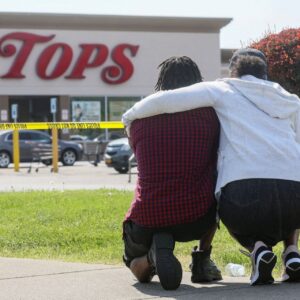It’s happening on a horrifyingly regular basis: innocent people in malls, supermarkets, churches, schools, any public place, are being shot by gunmen armed with high powered weapons, fueled by hatred and/or psychotic delusions to commit ghastly violent acts. It is traumatic for adults to hear about these massacres; how do we parents talk with our children about them?
GCP been offering advice about how we can help our children cope with horrific events for many years. Below you’ll find the most useful advice we’ve gathered from experts on how to help children deal with traumatic events like these.
* * * * * * * * * * * * *
Experts tell us that our approach to discussing mass shootings varies depending on how old our children are.
Preschool: Discuss only if your child brings it up. Since we have a great deal of control over what our preschoolers see or hear, it is possible that your little ones aren’t focused on this. No need to bring it up, and keep them away from news on the tv and other devices. But if they bring it up, tell them the very basics (“a lot of people were hurt, the man who hurt them was stopped”). Assure them that they are safe, and that you will keep them safe.
Elementary School (the early years): Keep it Simple. You may want to proactively talk to your child about what happened, particularly if you believe they are likely to hear about it in school or elsewhere. Give them a brief and simple version, reassure them that they are safe and that you and the other adults in their lives are there to protect them. Ask them if they have any questions, and encourage them to come to you if they do. Don’t force them to have a conversation about it if they don’t want to you may want to open the door to a discussion, especially if they seem anxious or withdrawn. Find out what discussions and safety drills are going on in their schools so you can be ready to listen and calm them if they have questions/fears about these conversations and drills. Be sure to monitor the time they spend in front of the TV, especially if the news is on. Shield them from the horrible images that can be repeated on the screen.
Later Elementary school/Middle School: Listen First, Then Talk. Ask what they have heard about it, and what they think, and let their answers guide your conversation. Correct any wildly wrong information, but give them the space to lead the discussion, and try to limit the scope of your answers to the questions they ask. Children these ages are likely to be more focused on their safety and what they would do in case they were under attack. Encourage them to focus on the fact that first responders are trained to keep them safe and will help make a very bad situation better. If the attacks are targeting one race , religious group or ethnicity, remind them that such twisted thinking has been an unfortunate part of our nation’s history, but that many people are working together to stop this hatred and the evil that it causes.
High School: Discuss Their Concerns, Help Give Them Context. Your older children will have been exposed to a lot of coverage of these events. They are likely to respond to them with anger as well as fear, shock and dismay. They can feel hopelessness, and despair. Talk with them about these feelings, let them know that you understand and share how you feel. But assure them that our nation and our world has a proud history of overcoming such evil acts of hatred. Remind them, if they need to hear it, that there are more good people than evil people in the world. Granted, we are living in very troubling times, but we must remember to give our children hope.
All Children: Monitor their exposure to the media onslaught of information about these shootings as much as you can. Encourage them to talk with you about how they are feeling and continue checking in with them as the days go by. Discuss how you as a family can help the communities victimized by this tragedy. Also remember that your children will be watching your reactions as well, so try to keep your emotions in check in their presence. You can agree that it is a scary situation, but try to maintain your cool during these discussions, even if your children say things that you don’t expect to hear. It may be tough but it is important to do.






